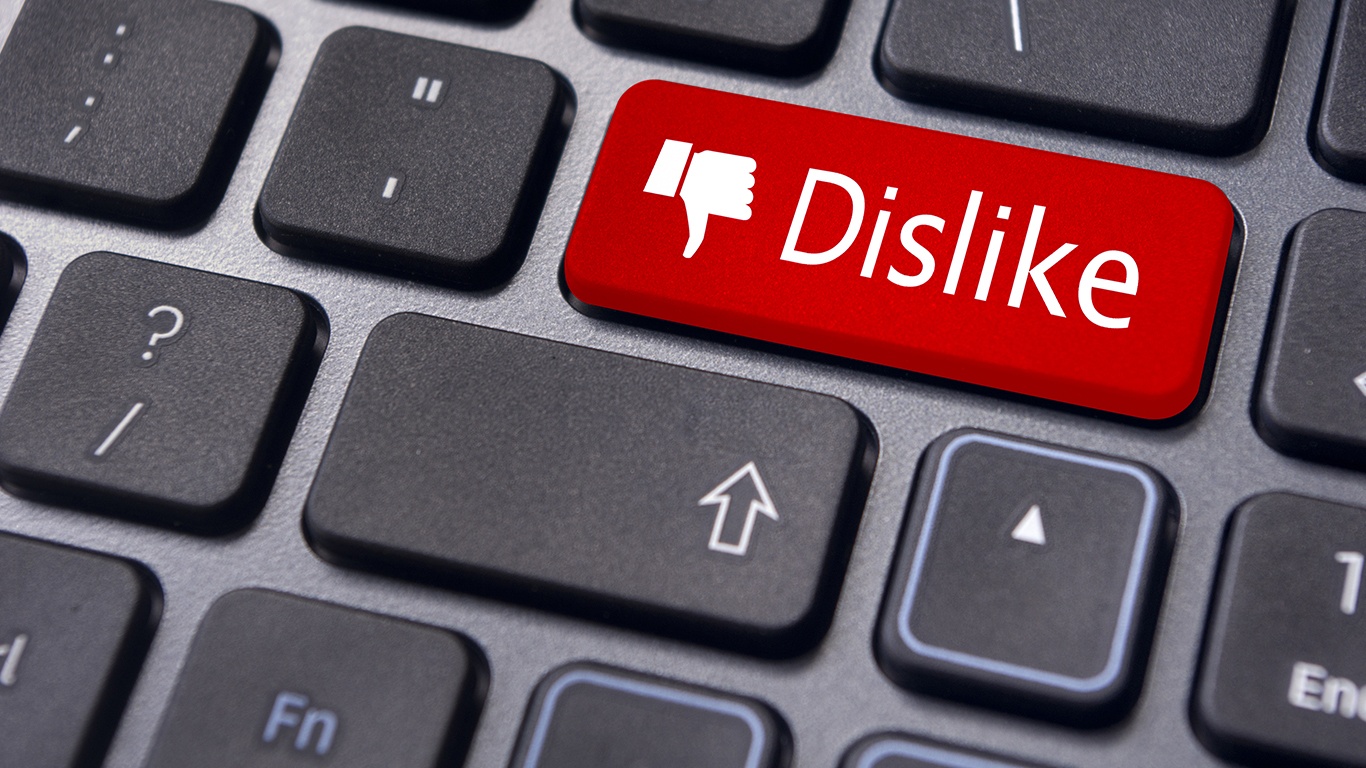It’s an increasingly common and frankly inevitable scenario: you’re sailing happily across the social media landscape, up-voting this and re-tweeting that, and it hits you: negativity in social media about YOUR company.
Now, as the immortal Douglas Adams advised in the Hitchhiker’s Guide to the Galaxy: DON’T PANIC. Negativity in social media is by no means perilous. In fact, you may even be able to spin it into a positive. Here are 5 steps that can take you in that direction, and turn (virtual) lemons into lemonade.
Step 1: EVALUATE
In the immediate aftermath of having your business insulted, criticized or attacked, you may feel compelled to fight fire with fire and throw out a few choice words of your own.
However, as satisfying as this may seem right now, it’s never a good move. Instead of neutralizing negativity in social media, you’ll be making things much worse.
Instead, take some deep breaths, squeeze your stress ball a few times (or maybe a few dozen times), and evaluate the message is. What does this poster want? What assumptions are they making? What is their end game? You probably won’t be able to answer all of these questions, but you should be able to get some clues as to where the poster is trying to take things.
ENGAGE OR IGNORE
Based on your evaluation of the situation – and in light of your social media policies as well – decide if you will engage or ignore the negativity. Don’t worry yet about what you’ll do or won’t do. Right now, you simply want to decide if engagement should occur.
Basically, you want to proceed with engagement if you believe that, on a fundamental level, there is the possibility of a dialogue. For example, the poster may have asked a question (albeit in a nasty way), or made a statement that was essentially a question (e.g. “I guess it’s clear you guys don’t care about your customers!”).
However, if you detect that a dialogue is not feasible at this time AND if the poster is not running rampant across the social media landscape whacking your brand, then ignore. This may be hard to do if you feel personally offended, but as Elsa would advise: Let It Go.
CONTAIN
Negativity in social media has a knack for going viral, simply because people tend to be far more interested in bad news than good news. With this in mind, if you decide to engage (per the step above), see if it’s possible to contain the situation by moving the discussion offline – such as to email.
The goal here isn’t to pin the poster into a virtual corner. Rather, it’s to try and get a clearer understanding of what’s behind the venom, and ideally, to clear up any misunderstandings and broker a ceasefire (an apology can go a long way).
What’s more, sometimes folks on social media get carried away (“keyboard warrior” and all that), and even if they want to tone it down, they won’t because it’ll look like they’re caving in. But if the discussion is private and out of the social media spotlight, they have the opportunity to do so – but without losing face. Sometimes, that’s all it takes.
DEFLECT
If containment isn’t possible or doesn’t work, then the next move is to deflect. You do this by professionally, politely and succinctly stating facts that are central to the issue.
For example, a poster may be complaining about being placed on hold “for an hour” (probably an exaggeration, but nevertheless, we’re talking about a social media post – not an affidavit). If so, you may point to a page on your website that allows customers to launch a web chat and speak with a rep within minutes. Or perhaps you have a policy where customers can leave their number and get a call-back later in the day. If so, you’d post a link to the section on your website that highlights this.
Essentially, the idea here is to address the specific poster who is spreading the negativity in social media, but more importantly, you’re sending a message to the larger community that is very interested in seeing what you do, and how you do it. In this way, deflecting the issue in a professional and capable manner can turn out to be a positive.
DELETE AND/OR BAN
If the attack is unfolding on your social media properties and it gets out of hand (e.g. if threats are made or foul language is used), you may find it necessary to scrub the posts/comments/Tweets.
If so, be very selective of when you pull out your virtual eraser. Many businesses actually choose to leave negative comments alone, simply because getting rid of them can be even more problematic – i.e. it can look like the businesses is “censoring” and only allowing fans to make comments. Obviously this isn’t the case, but that’s the perception that can arise.
In the same light, banning a poster is a last resort, and shouldn’t be done without at least one warning. Frankly, this probably isn’t going to work, but it’s worth a shot. Sometimes keyboard warriors calm down when they know that they’re under the spotlight.
Learn More
If negativity in social media is making you wish Zuck had never crawled out of his hoodie, then don’t worry: give Leap Clixx a call. Your consultation is free, and we’ll help you move forward and on your way to loving social media again! Need more Inbound Marketing best practices? Download our FREE eBook below:
{{cta(‘bd8404aa-e053-481c-9e10-8dd744e59b2f’)}}





